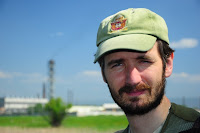The organisation I'm here with, the Great Baikal Trail, is trying to build a network of trails around lake Baikal, and every summer camps of international volunteers set off into the wilds to extend the paths.
 The aims are not only to make it easier for tourists and hikers to get around, but also to promote sustainable tourism for the benefit of local communities in areas which have great potential to attract tourists but currently suffer from high unemployment.
The aims are not only to make it easier for tourists and hikers to get around, but also to promote sustainable tourism for the benefit of local communities in areas which have great potential to attract tourists but currently suffer from high unemployment.GBT is preparing for the work this summer, which involves going out on the trails with various experts and national park officials. Along the length of the trail problems are noted, such as bridges damaged by the harsh winter or trees which have fallen across the trail. At the end of the trail the next few summers' work is marked out with red ribbons.
I tagged along on an expedition to Tankhoi to check the trail in the Tankhoi nature reserve. Several hours from Irkutsk in an elektrichka we were trundling around the south of the Lake. After a few hours wait at Sludyanka, which gave us the chance to enjoy a bite to eat and admire the almost mirror-like stillness of the lake, we continued to Tankhoi.
 Spending the night in the Tankhoi hostel, early the next morning our group set off. After several miles we came to the trail built by GBT. Wide, flat and clear of obstacles the trail clearly marked a route through what would otherwise be thick undergrowth. Generally following the path of the Osinovka, the trail followed a valley path offering fantastic views through breaks in the trees and the odd chance to rest by the river.
Spending the night in the Tankhoi hostel, early the next morning our group set off. After several miles we came to the trail built by GBT. Wide, flat and clear of obstacles the trail clearly marked a route through what would otherwise be thick undergrowth. Generally following the path of the Osinovka, the trail followed a valley path offering fantastic views through breaks in the trees and the odd chance to rest by the river.The height of the trail and the trees gave us some shade from the sun, and although ticks were present (remember to check every 40 mins), mosquitoes and other annoyances were minimal.
 At the end of the trail half the group, armed with rolls of red ribbon, continued on through the undergrowth to plan the summers' work. Vova, Natasha, Stas, Max and Sveta were in constant discussion about the merits of building here or there, up or down, around or through. Learning interesting tidbits of path building info (when building switchbacks keep the eventual destination out of view to discourage people going directly down the mountainside) on the way, I followed the group through the forest.
At the end of the trail half the group, armed with rolls of red ribbon, continued on through the undergrowth to plan the summers' work. Vova, Natasha, Stas, Max and Sveta were in constant discussion about the merits of building here or there, up or down, around or through. Learning interesting tidbits of path building info (when building switchbacks keep the eventual destination out of view to discourage people going directly down the mountainside) on the way, I followed the group through the forest.After several hours of negotiating steep slopes, the group decided enough planning had been done and headed back down to rejoin the rest. From there a relaxing hike back followed, including crossing a fantastic rope bridge from a particuarly impressive rocky outcrop.
Tired but satisfied, a good meal of soup, salad and bread was enjoyed by all and complemented by a couple of bottles of spirits. A good end to a good day.














